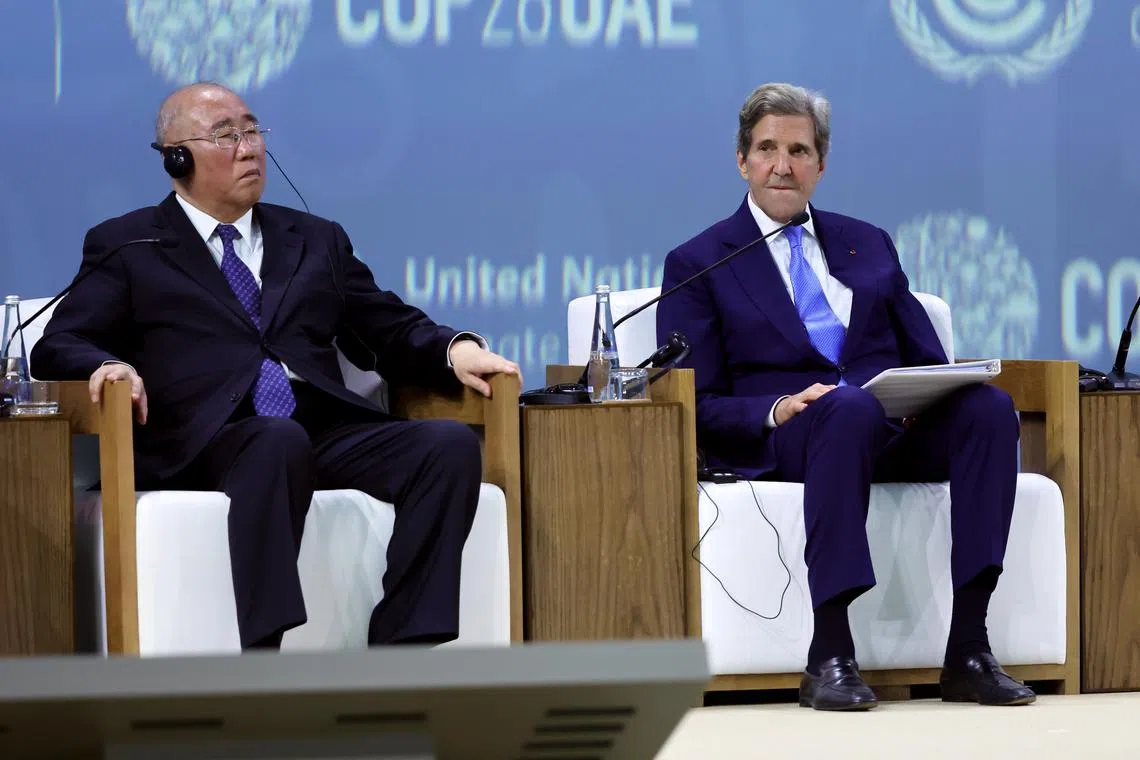China’s veteran climate chief works with US to clinch COP28 deal
Sign up now: Get ST's newsletters delivered to your inbox

China’s climate envoy Xie Zhenhua and his US counterpart John Kerry have worked as closely as ever at the annual COP talks in 2023.
PHOTO: EPA-EFE
China’s climate envoy said his team at COP28 is in intensive talks with the United States and others to find language on fossil fuels that can bring the two-week climate summit to a successful close.
Mr Xie Zhenhua, 74, a fixture of global climate diplomacy for more than a decade, will retire after this year’s COP in Dubai and wants to end on a high. He told reporters on Dec 9 evening that compromise may lie in the agreement he reached with US counterpart John Kerry at the Sunnylands estate in California in November.
That would link the phase-down of fossil fuel to the acceleration of renewables deployment. But the trouble for many diplomats in Dubai will be the Sunnylands statement focused on oil and gas used in power generation, not through the wider economy. Still, Mr Xie, who spent much of Dec 9 locked in talks with US officials, remained optimistic.
The dynamic between the US and China is often seen as the key to success or failure at the annual UN-sponsored COP talks and Mr Xie and Mr Kerry have worked as closely as ever this year.
“We hope to find a clear and correct future direction with good vibes and the greatest inclusiveness, so that everyone can accept and be satisfied with the results,” Mr Xie told a press briefing on Dec 9.
On fossil fuels, he said: “If we do not resolve this issue, I don’t see much chance in having a successful COP28.”
Including a fossil-fuel phase-down has become the central issue in Dubai as talks enter their final three days.
To date, the UN agreement on climate change includes language on coal use only, and there is a coalition of more than 100 nations in favour of broadening it – but Saudi Arabia and other oil-producing nations are pushing back.
The latest draft text released on Dec 8 evening offered four options. The weakest is to drop any reference to dirty energy altogether, while the strongest calls for a “phase-out of fossil fuels in line with the best available science”.
Few expect an agreement on a fossil fuel phase-out, but there is some optimism compromise language around a phase-down can be worked out.
During the briefing that lasted more than an hour, the first held by the Chinese delegation group since the conference started on Nov 30, Mr Xie repeatedly referred to the joint statement after the meeting with his US counterpart in November in California.
Asked if China backs a phase-out of fossil fuels, he replied that both China and the US had seen the agreement as a solution to settle disputes in Dubai when they were drafting it.
The Sunnylands agreement does not include “phase-out” but says that both sides “intend to sufficiently accelerate renewable energy deployment in their respective economies through 2030 from 2020 levels so as to accelerate the substitution for coal, oil and gas generation”.
China, the world’s largest emitter of greenhouse gases, has been cautious on wording about eliminating fossil energy use.
Since a phase-down of coal use was agreed at COP26 in Glasgow,
One major addition to the COP28 text is expected to the inclusion of a pledge to triple the deployment of renewable energy by the end of the decade.
Mr Xie, who recovered from a stroke in 2023, is set to retire after the Dubai COP meeting
He is admired by negotiators, observers and researchers in both China and overseas for his relentless work ethic into old age and through ill health. He is a well-known figure at COP and always greeted by well-wishers as he walks between country pavilions and negotiating halls.
Before the press briefing, China and US negotiators met for hours in the Chinese pavilion, with Mr Xie and Mr Kerry personally leading talks for about an hour.
China’s veteran envoy told reporters that he saw COP28 as the toughest he had ever experienced in his long career as a climate negotiator.
“There are so many issues to settle – 206 disputes in total,” Mr Xie said of the negotiating text under discussion. “We have to do subtraction, not addition. It is always easy to add, but difficult and necessary to subtract.”
Beyond fossil fuels, one of the key issues at this year’s COP is progress on agreeing goals for adaptation to a warmer world.
The first draft of that part of the text was set out on Dec 10 morning. It contains a long list of voluntary goals to be achieved by 2030, including providing universal access to safe and affordable water, attaining climate-resilient good and agriculture, and halving climate impacts on infrastructure.
It commissions a series of reports by 2025 and requests that the long list of goals have specific, quantified targets based on two years of work that will conclude in Brazil at COP30.
“A reasonable framework,” said Ms Ana Mulio Alvarez, researcher at think-tank E3G. “However, without robust means of implementation, the framework will remain hollow and toothless.” BLOOMBERG


